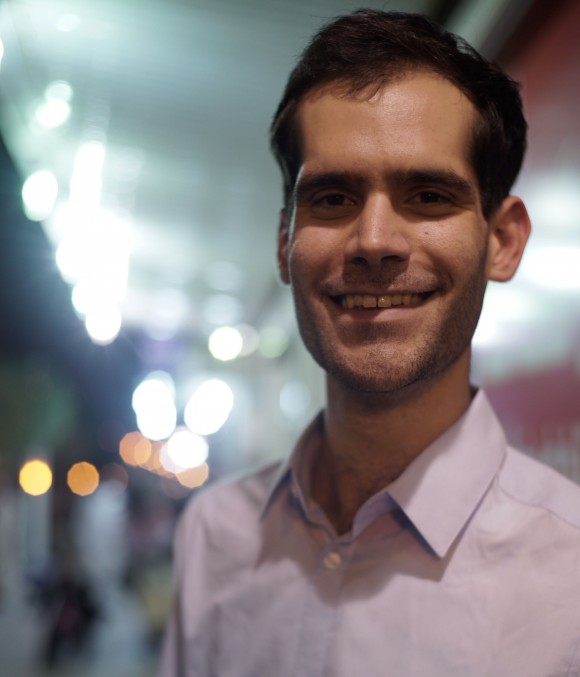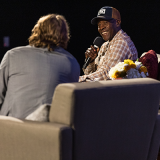Alumni Spotlight – Jonathan Formica
March 23, 2016
Every so often, we’ll be spotlighting alumni and what they are up to these days. These Q&A sessions will give you a bit of insight into where the world has taken them since graduation.
This week, the spotlight is on Jonathan Formica (BFA/Television and Broadcast Journalism ’12).
DODGE: Share your career path with us – how did you get where you are now?
JONATHAN:
I am currently producing
The Human Trial
, a feature length documentary following a clinical trial that could potentially cure insulin-dependent diabetes. I’m actually writing this on my flight back from Riyadh, Saudi Arabia where we were filming part of our story.
The Human Trial
is a project I have been a part of since my senior year at Chapman. Over time, both the project and my involvement have greatly evolved.
Long story short: I started as an intern at Vox Pop Films, the production company that is producing the film. I was then hired as an office PA and worked my way up to production coordinator, associate producer, co-producer, and ultimately, producer.
In addition to
The Human Trial
, Vox Pop produces commercials and branded content. This has allowed me to dip my feet into a little bit of everything at the company. My boss likes to joke that the commercial side of things is my “day job” and the film is my “night job.”
DODGE: What was the biggest adjustment you faced after graduation and how did you overcome it?
JONATHAN:
I – along with all Dodge students – am incredibly lucky. We have access to top-notch equipment, professors who not only teach, but mentor and befriend, and incredible experiential learning opportunities. Two such opportunities I had were the International Documentary Program led by Professor Jeff Swimmer, and the Community Voices program led by Professor Sally Rubin. Both programs provided my classmates and myself with generous grants to make fully funded short documentaries.
These programs helped me to grow personally and as a filmmaker. However, we all know most people do not graduate and get handed a pile of money to make a film.
I think that is one of the biggest adjustments I faced after graduation – how on earth does one apply the skill set learned in a controlled educational setting to the film
business?
After all, that’s exactly what this is – a business.
Luckily, I have learned a lot about navigating the complexities of the business through my internship, and ultimately job, post Chapman.
By working on a longitudinal vérité documentary for the past four years, I have learned firsthand how to balance the needs of fundraising with running a busy production office. I will admit, it is always a challenge – how do we follow a behemoth of a story while keeping the lights on. I don’t think this is anything to “overcome,” but rather, something to adapt to and learn from.
I believe as long as I am learning something new every day, then I am heading in the right direction.

DODGE: What is the best advice you have received and/or what advice would you give current students?
JONATHAN:
One of the best pieces of advice I have received on the job is from the director of the
The Human Trial
, Lisa Hepner: “Assuming makes an ass out of you and me.”
In this business, where storylines and business priorities change at a moment’s notice, it is easy to think you know something even when you actually do not. Simply assuming anything to be fact, such as what another person might or might not do or a decision that may or may not be made, can really land you into hot water.
Keeping assumptions in check is key as you navigate life, from job search to running a company, and everything in between.
DODGE: What is your favorite memory from your time at Chapman?
JONATHAN:
For fear of sounding cliché, it is hard to pinpoint precisely one favorite memory from my four years at Chapman. There was the experience through Professor Jeff Swimmer’s international documentary program or the trip to the Yokoji Zen Mountain Center with Professor Mark Maier’s leadership class. Then there was always that time Professor James Gardner called me spineless in his studio television class. I suppose “tough love” is what makes a great mentor.
At the end of the day, what made these memories was not just an international location or class at a mountain retreat, but the people who shared those experiences and made them possible.
DODGE: What have you taken from the classroom and applied to your career?
JONATHAN:
I remember fall semester of my junior year specifically. I was working in post on a short film produced through the Destination: Africa program while also shooting and editing for the Community Voices program. This was also the same time I was taking one of the most demanding classes for my minor in Leadership and Organization Studies. These three courses and experiences, culminating all at once, truly challenged me on multiple levels. However, it also enabled me to develop strong time management skills. These time management skills have proven invaluable, especially when juggling multiple immediate tasks on and off the job. Having to make quick decisions and prioritizing needs at work on a daily basis is critical to navigating and thriving in film both at Chapman and beyond. Ultimately what I took from the classroom was not a single lesson, but a more developed skillset in managing limited time and resources.


